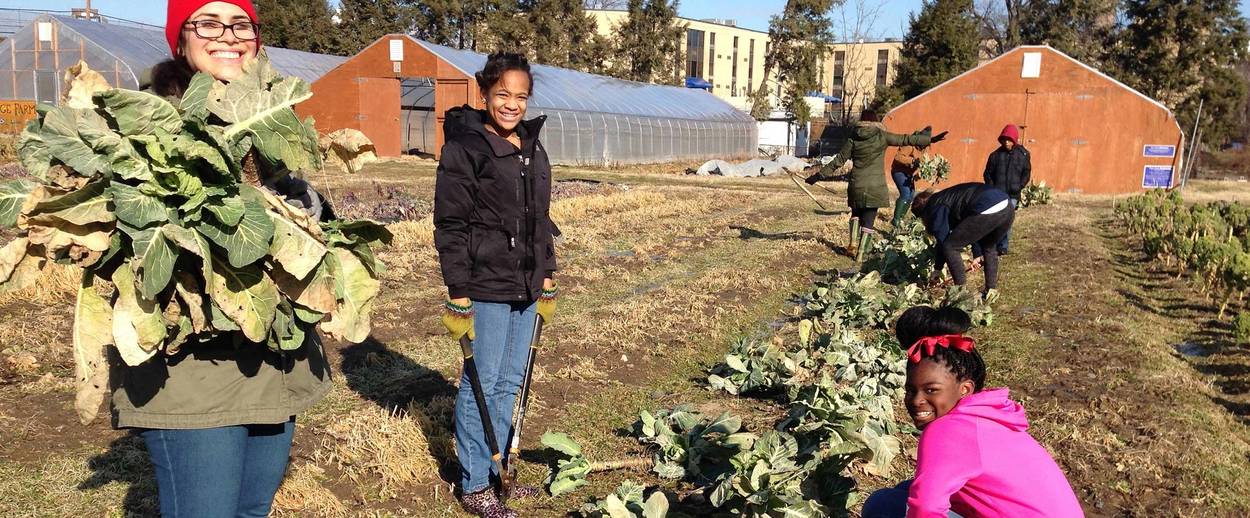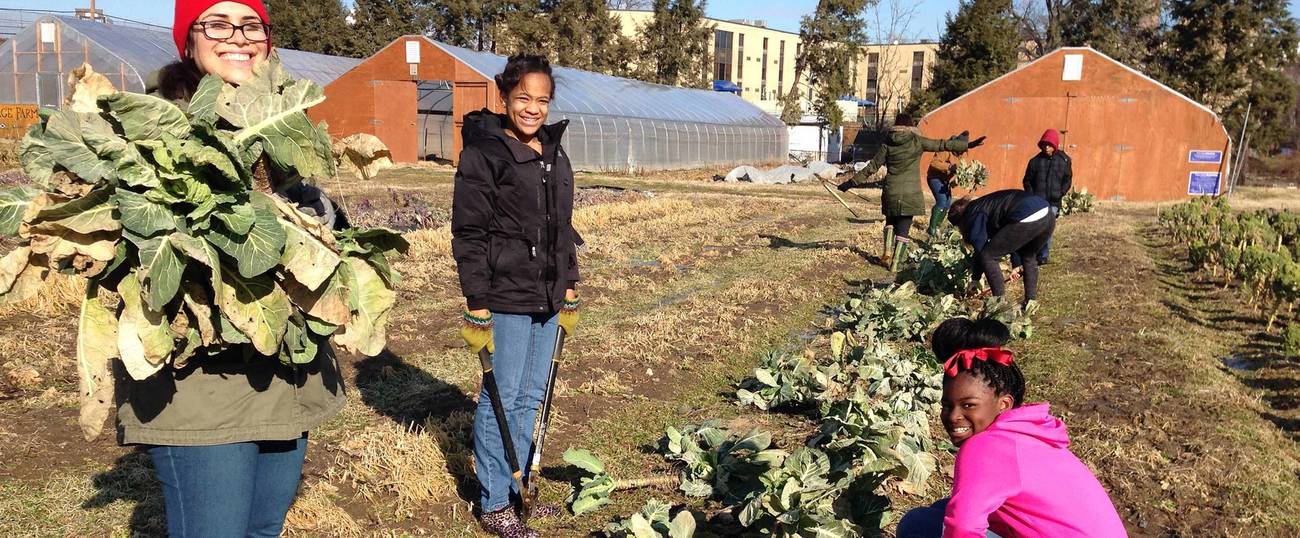Ethical Eating
Food-justice initiatives bring Jewish values to the farm—and the dinner table




As executive director and co-founder of Beantown Jewish Gardens, Leora Mallach has led dozens of Jewish food workshops, taught how Jewish texts and tradition connect to food justice, built Jewish educational gardens, and organized Jewish food conferences. Last year alone, her programs reached an estimated 1,000 children and adults in Greater Boston’s Jewish community.
But what stands out for her is an incident from the early days of Beantown Jewish Gardens (also known as Ganei Beantown) back around 2011. The organization received a grant from CJP, Boston’s Jewish federation, for programming to engage young Jewish professionals. At one such program—a beer-brewing workshop that incorporated beer brewing with the study of Jewish texts—a 20-something attendee told Mallach that it was the first time he had stepped into a synagogue since his bar mitzvah.
“That story sticks with me and reinforces why we need to make Judaism contemporary and breathe new life into Jewish tradition,” said Mallach.
Her particular passion is building Jewish community around the very contemporary issue of food justice—raising consciousness about access to healthy food and the ethical implications of food choices, such as the environmental impact. “We are creating awareness of food injustices in our current food system,” she said, “and that there is a Jewish conversation around it.”
The organization’s newest initiative, which launched this month, speaks to this need. The Ta’amim Tovim Education Series—Putting Our Food Values Into Action consists of webinars and in-person sessions developed with the Jewish Initiative for Animals to train Boston-area Jewish institutions how to create ethical food policies.
This initiative reflects broader general awareness about the implications of food choices, such as where food comes from and how workers and animals are treated. “Growing numbers of families and institutions are essentially saying, ‘It may be technically kosher in some narrow sense, but if the animals have been kept in inhumane conditions for all their life, do I really feel it is proper to eat it?’’’ explained Nigel Savage, CEO and founder of Hazon, which works to build sustainable communities. He witnessed these issues first hand in summer 2000, when Hazon’s environmental bike ride team visited the now-shuttered Agriprocessors’ plant in Postville, Iowa, and was appalled by the industrial meat production, including animal abuse, food safety violations, and poor working conditions.
The Jewish food movement in North America has evolved since those early days of Hazon bike rides, and the launching in 2004 of the first Jewish community-supported agriculture (CSA) program. Food-justice initiatives focusing on education, sustainability, growing food, and addressing the root causes of food insecurity rather than food charity (e.g., donating canned goods to food banks) have sprouted up across North America—many headed by leaders trained at Jewish environmental programs such as Teva, the Adamah Fellowship Program, and JOFEE (Jewish Outdoor Food Environmental Education).
One area of explosive growth is Jewish farming. Since the founding in 2010 of Urban Adamah, the first Jewish urban community farm in the U.S., Jewish urban and community farms have cropped up in such locations as Toronto, Baltimore, Boulder, Colorado, and Northampton, Massachusetts. Jewish overnight camps have begun to teach campers to grow food and farm. An international Jewish Farmer Network lists more than 600 members in its Facebook group, and plans its first conference in February 2020.
No longer does the Jewish food movement sit on the margins of mainstream Jewish life. It now partners with federations, JCCs, Jewish social service agencies, synagogues, and day schools across North America, and has also received foundation grants.
Such initiatives connect young people to Judaism in a fun, engaging way, said Nati Passow, co-founder and executive director of Jewish Farm School in Philadelphia: “Instead of being in the classroom, you learn about the Jewish agricultural laws and how the plants relate to the cycles of the year.”
Passow illustrates the point with a favorite story. When his brother was in rabbinical school, he had studied intensively the agricultural laws in the Mishna and Talmud. But it took a visit to a community farm to truly bring these laws to life. “How the more so it is for someone who is not superconnected to Judaism. It is making Judaism come alive and connecting people to earth-based Judaism,” said Passow.
Rebecca Croog, a 28-year-old Ph.D. candidate at Temple University and recently elected Jewish Farm School board member, fits this profile. Despite a day school education and a Jewishly committed family, she lost contact with Judaism once she went off to college.
During college, Croog became interested in sustainability but never recognized its connection to Judaism. When she later moved to Philadelphia for graduate school, a friend invited her to volunteer with Jewish Farm School’s “Philly Farm Crew”—a partnership of Jewish Farm School and Repair the World that annually mobilizes approximately 300-500 volunteers, both Jews and non-Jews, to work on urban farms and gardens throughout Philadelphia.
Croog credits Jewish Farm School with rekindling her Jewish identity and connection to community. “The Jewish Farm School helped me practice the Jewish faith, showing me that Judaism has within it food-justice principles in the Torah, such as sharing the harvest,” said Croog, who now hosts Shabbat dinners, attends Shabbat and holiday services, and participates in Jewish Farm School’s study group.
Since 2006, Jewish Farm School has connected over 7,500 Jewish adults, students, and children with urban agriculture through education and farming—as a way to live more sustainably, while relating these skills to Jewish tradition. Projects address both immediate needs and longer-term solutions, and are based on creating a food-justice system that reflects core Jewish agricultural values such as the needs of the most vulnerable; the value of physical labor, treating workers and animals fairly, and integrating cycles of rest for all; and the emotional and spiritual connection to food, plants, nature, and wilderness.
“So when we talk about food justice, we think of it as an umbrella that addresses a range of issues, including food security and food access,” explained Passow.
The newest initiative is Project 10%, scheduled to launch this spring, and inspired by the ancient biblical practice of ma’aser—setting aside 10 percent of the harvest for those without land. Its objective is to encourage the Jewish community to dedicate 10 percent of its time to working with urban farms and food-justice organizations.
Like similar organizations, Toronto-based Shoresh offers nature-based Jewish education, with projects to grow food, address food insecurity, and reduce food waste. What’s unique is Shoresh’s comprehensive initiative to mobilize the Jewish community to protect the honeybee population, which experts say is at serious risk.
“Bees are an important part of the Jewish food-justice movement for multiple reasons,” explained Sabrina Malach, Shoresh’s director of engagement and resident beekeeper at Bela Farm, Shoresh’s 99-acre rural home in Hillsburgh, Ontario. “Through pollination, bees bring us more than 90 percent of the fruits and vegetables we enjoy and it is estimated that every third bite of food can be attributed to a pollinator. Our food system and security depend on bees and if they disappear, we will all suffer.”
Malach says that bees are treated unjustly because contemporary farming practices—monocropping, pesticide use, and GMOs—and a host of other issues such as urban sprawl and climate change have threatened the existence of the world’s pollinators including honeybees, removing their habitat and foraging areas.
With a focus on nature connection, reforestation, and pollinator conservation, Shoresh has set up a nine-hive bee apiary and planted a four-acre bee sanctuary with native wildflowers at Bela Farm. Volunteers help tend the flowers, care for the pollinators to keep the bees healthy, and harvest the beeswax and honey, which is packaged for sale as Bela’s Bees Pure Honey. While some vegans and animal rights activists take issue with honey production, Bela Farm takes a bees-first approach by planting flowers and allocating sufficient amount of land for habitat and floral resources—as well as cultivating awareness and appreciation about bees and pollinators so the community can take better care of them.
Over the coming season, plans are to engage more volunteers as shomrei adamah, guardians of the earth, to help care for the pollinators. A beekeeping mentorship program will train more volunteers to work in the apiary.
Preparations are now underway for shmita, the seventh or sabbatical year of the agricultural cycle mandated in the Torah, which begins on Sept. 7, 2021 (the year 5782 according to the Hebrew calendar). By the shmita year, the goal is to expand the bee sanctuary to 20 acres with 30 active beehives that will produce honey for Rosh Hashanah and beeswax for Shabbat, Havdalah, and Hanukkah candles.
Hazon’s Savage is optimistic about the future of the Jewish food movement. “What is so amazing about food and the food choices that we make every day is that when we think about them, learn, reflect, change our choices … we can strengthen Jewish life and make a better world for all,” he said. “It’s why I think the Jewish food movement is going to continue to grow in the next few years and continue to make the world a better place.”
Paula Jacobs is a writer in the Boston area.